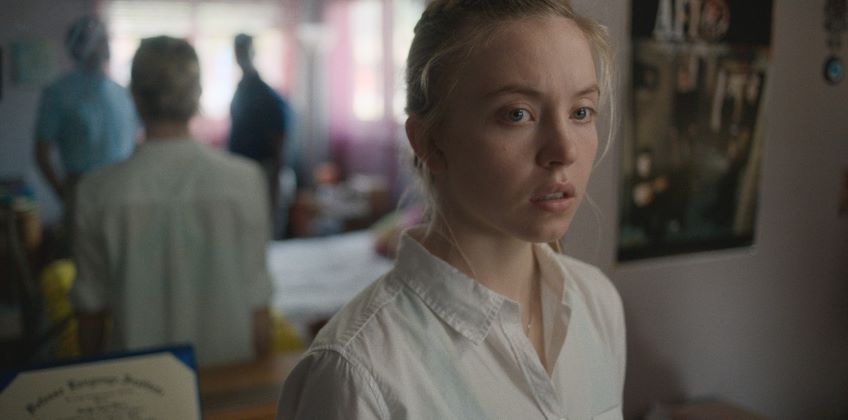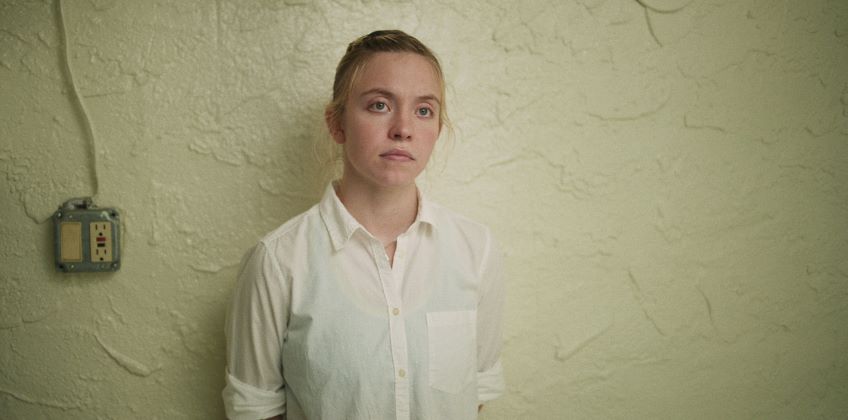Joyce Glasser reviews Reality (June 2, 2023) Cert. 12A, 83 mins. In UK & Irish Cinemas.
Reality is the first of two movies this month (La Syndicaliste comes later) that portray the real-life ordeals of women whistle blowers. Writer-director Tina Satter’s feature film debut, based on her stage play Is this a Room, is, however, unique and her approach explains the short running time. The dialogue is taken directly from the FBI transcript of their conversation with Reality Winner (Sydney Sweeney, series: Euphoria and The White Lotus) when they paid her an unannounced visit on June 3, 2017.
The only context we are allowed comes in a short introductory scene 25-days before the main action. We are in Reality’s shared office at Air Force contractor Pluribus in Georgia. It is a windowless, claustrophobic space where Reality sits behind a cramped cubicle where she is translating documents from Persian relating to Iran’s aerospace programme. Or trying to. Above her on all sides are television screens bombarding her with Fox News feeds following Donald Trump’s election.
With the exception of the office, the only set is the then 25-year-old Reality Winner’s home in Augusta, Georgia. On June 3rd, Reality, petite, blond, and pretty, is approached by Special Agent Garrick (Josh Hamilton) and Special Agent Taylor (Marchánt Davis) as she returns home from teaching Yoga, dressed in short shorts and a t-shirt. She is carrying a bag of groceries she will never eat. She is asked to secure her pets: a cat and a frightened rescue dog that she will never see again. Other FBI agents arrive to cordon off her house and yard – in full view of her neighbours – as a crime scene.

Special Agent Garrick informs Reality that they have a search warrant and informs her that their visit is about the possible mishandling of classified information. They can talk at the FBI’s offices or in her home once it is secured. They ask if she has weapons in the house. In fact, she has three. This is America.
Without reading Reality her Miranda Rights, the agents ask to be taken to a room where they can talk. Reality, a former US Air Force airman and cryptologic linguist for the National Security Administration, left the Air Force in Georgia where she was translating from Persian, Pashto and Dari (spoken in Afghanistan). After receiving an honourable discharge, she moved away (for reasons that are unclear) and then returned to Augusta as a civilian for reasons that are also unclear. But she looks at her current job as a transition step toward continuing her career with a high security clearance.
What we do not learn from the film is that the U.S. Air Force commended Reality with a medal for her work. Her translations led to the capture of hundreds of enemy agents and the identification of 900 high value targets.
The room Reality leads them to is an odd space that resembles a garage more than an unused, spare room in a well-lived-in bungalow. It is devoid of furniture, curtains or any decoration. Standing opposite the agents against the wall, Reality tries to defuse the tense atmosphere with humour and the agents, with formalities and small talk. The harrowing, interrogation that follows is chilling, but tinged with moments of dark humour.

The agents have been tipped off – inadvertently as it turns out by the news website The Intercept, the very website to which she had allegedly sent the documents – that Reality leaked classified information she obtained at work to Intercept. She does not know that they know, and at first her answers to their indirect line of questioning are cautious and difficult to gauge.
Finally the agents, who are playing a version of good cop, bad cop, cut to the chase. “Does the mishandling of information ring any bells?” Reality takes her time, and says she often printed out documents because it was easier to translate.
Then, in a scene bordering on the surreal, she is asked about her trip to Belize. ‘I went Saturday and came back Monday,’ she answers. This strikes us as a long way to travel for such a short holiday and might arouse suspicions. What was the purpose of her trip? ‘I wanted to see the Mayan Pyramids,’ she answers, totally seriously before adding more detail. ‘The first day I went on a horse. The second day I went on a boat trip.’ It all sounds cagey.
Reality tries to relax but is becoming increasingly distraught. And then Agent Garrick gets direct and specific: ‘What about a document you printed out on the 9th of May?’
Paul Yee’s camera work makes us feel like we are in the room – or watching the interview on closed circuit TV – and the two special agents are so intimidating you might squirm, imagining yourself in Reality’s shoes. Sweeney, who withstands intense close-ups, is sensational, her face recording her increasing anxiety and her body language registering her fear and nervous exhaustion. There is nonetheless something tough, like a moral high ground, about her that dispels a feeling of total vulnerability.
Satter does not focus on what is leaked, although part of us longs to know more about just that. At the very end we learn just enough, however, to be invested in the outcome.
The report on Intercept described Russian military attempts to interfere with the US Presidential elections in 2016 by hacking a voting software supplier and spear phishing local election officials. Hilary Clinton’s campaign servers were also hacked. Trump repeatedly attempted to obstruct Robert Mueller’s 2019 investigation and downplay the Russian interference in the election result. Reality felt that was news that should be known to the American public.




